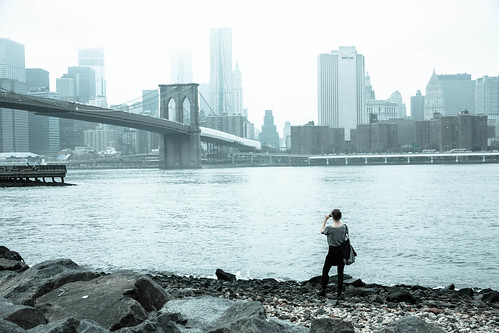Digital photography made it easier than ever to get into the medium. If you feel ready to move on from using your mobile or a compact point-and-shoot camera as your main tool of taking photos, but not sure what to do, this post is for you!
 |
| Tel Aviv, 2013 |
Lately a few of my friends asked me for advice about getting into photography. I though it would be a good subject for my next post and a natural continuation to the previous post, where I talked about the dilemmas
I faced before taking the plunge into Photography.
1. Get A Camera:
It's your first serious camera, so I would advice not to go crazy buying the most expensive camera right away. A basic entry SLR and kit lens will probably not break your bank and will still provide you with a very potent tool to learn the trade with. Getting a second hand camera is also a great way to start.
Nowadays, you can also go for a Mirrorless camera, that offers you mobility and a smaller package without compromising the quality of the picture. One thing I do feel is missing on many mirrorless cameras is an EVF, Electronic View Finder (It might be just me being used to SLRs, but I do feel that a viewfinder gives you a more immersed experience and allows you to compose better). So, if you can, buy one with an EVF.
 |
| You can probably find something newer than that. My Great-Grandfather's Zenit-1 Camera |
2. Learn Basic Technique:
If you want to take full advantage of your cool new camera, you should know how the damn thing works.
Learn The Basics of Exposure: Aperture, Shutter and ISO; What White Balance means, What are Metering Modes and Depth of Field.
Take advantage of free resources. The Internet has a lot of good sources to learn all this. You can also buy one of the dozens of books and guides on the subject (I can recommend 'The Fundamentals of Photography' by Helen Drew, but really the choices are endless).
As you familiarized yourself with those basics, learn how to use your camera settings and features. Practice and experiment with each of them.
3. Learn Basic Composition:
Ultimately, you want to take better photos. No matter If you're using a Full Frame SLR or an Iphone, you need to understand what makes a photo "good". Learn about basic composition; what is the Rule of Thirds. 'The Photographer's Eye' is an excellent book on the subject. Michael Freeman does a great job of explaining and Illustrating the composition and design elements.
 |
| Symmetry and geometry as a compositional elements, Toronto 2012 |
Learn to use a photo editing program. Adobe Lightroom / Photoshop set the standard in the field, and there are alternatives, some of them totally free (Aperture, GIMP and Capture One to name a few). Using a photo editing program is an inseparable part of digital photography similarly to working in the Dark room is for film photography.
A book I can recommend is "Adobe Photoshop for Photographers" by Martin Evening. Here as well, you can find ton of guides, tips and inspirations online for free. Your options in the digital photography are limitless. Hopefully you won't use it to crate those ultra-violate HDRs :)
 |
| Using Editing to create atmosphere, NYC 2012 |
Take Courses and photography workshops. I took 2 courses from Technion Photography Center and I totally recommend it. A class in photography provides you with opportunity to discover new techniques and ideas as well as provides challenges that will help you to become a better photographer. Not to mention it's a great opportunity to meet other aspiring photographers. Studying in a group can create a supportive, creative environment.
Taking a course in a photography school also gives access to expensive equipment like professional studio lighting or a dark room.
Try finding classes that are taught by practicing photographers, who photograph for a living and preferably studied photography themselves. This way you'll actually learn from someone who has been down the road you're taking and is practicing the trade.
 |
| Self Promo, Advanced Photography Course, Technion Photography Center |
Like in any other field you should learn from the best. Find photographers who's work you admire. Learn what they were photographing, how and why. Try to imitate it and learn from it. But when I say imitate, I do not meat ripping them off, I do however, mean imitation as a form of studying the techniques and style they use. From there you can take it to your own direction and apply your personal vision to it. Buying Photography books, studying Art (noticed how many of the great photographers studied art?), going to exhibitions is a really good way of getting familiarized with someones body of work (Compared to it, consuming their art digitally from a screen is just not the same).
7. Practice makes Perfect
Take photos. Photography is a craft and an art form and like most things in life, you need to practice to get better at it. There is no substitute for taking photos (beyond the fact that that is the reason you got into photography to begin with). Keep your camera with you all the time & Take photos regularly. If I used the time I spend obsessing about what photo gear to buy next to actually get out and shoot with the gear I do have, I'd be a better photographer and probably a happier man (Said I, while obsessing over the Fuji x100s).
Remember it's a hobby, so you should enjoy the learning process, experiment and find the kind of photography that makes you happy, whether it's spending hours in nature waiting for the perfect light to capture a stunning Landscape or roaming the streets of your city documenting everyday street life.
 |
| Tel Aviv, 2013 |






0 comments:
Post a Comment